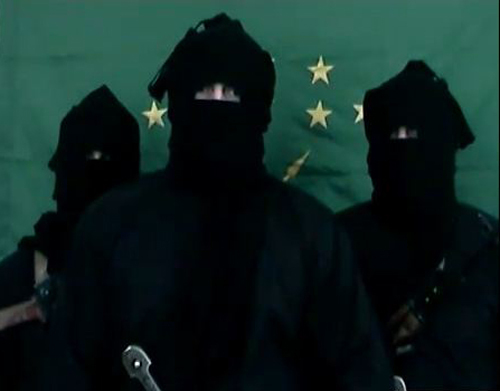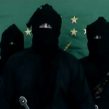
Kabardino-Balkaria’s “Black Hawks:” Grassroots Vigilantes or FSB Surrogates?
Publication: Eurasia Daily Monitor Volume: 8 Issue: 49
By:

Over the past month or so, the Russian media have been very actively reporting on the creation of an anti-Wahhabi paramilitary unit operating on the territory of Kabardino-Balkaria in response to the actions of insurgents against members of law enforcement agencies. It has been also claimed that this unit will kill family members of militants. There are several aspects of this story that are highly disturbing and alarming: the name of the paramilitary unit, its alleged members giving interviews to any Moscow journalist they bump into, and the way Russia’s state-controlled media outlets suddenly started advertising this mythical organization.
The fact is that in early February 2011, a statement was disseminated in Nalchik, the capital of Kabardino-Balkaria, about the creation of an organization called the “Black Hawks.” A man in a black mask hiding his face and neck read a statement declaring: “A reward of two million [rubles] has been announced for [killing] you. We do not need this bounty. We will liquidate you for free. Never in the history have Adyges or Balkars [ethnicities in the northwestern Caucasus] obeyed Chechens. You, Dzhapuev [the Emir of the Kabardino-Balkaria Jamaat], have publicly stated that your master is Doku Umarov [the Chechen rebel leader who is Emir of the North Caucasus Emirate]. He ordered you to kill and rob your own people, report on your exploits on videos, and then give the stolen money to him. Umarov has betrayed his people; he delivers the young to the slaughter, and then declares them martyrs [shahids]. He himself does not seem to be in a hurry to go the gardens of paradise! Mamishev and Shameyev, you are killers and we will soon find you. Your whereabouts are known to us, and the punishment will be short” (www.youtube.com/watch?v=c9m3iegEs9Y). Here, clearly, the emphasis is made on eliciting ethnic hatred towards the Chechens and on trying to extricate themselves from the influence of the Chechens, which confirms that the Russian authorities are well aware that the key to solving the problem in the North Caucasus lies in the mountains of Chechnya.
First, the man in a mask makes a statement in good Russian, without any accent characteristic of Kabardins or Balkars, monotonously reading his text as if he were a television announcer. Next, the Russian media, as if they were awaiting orders from above, begin a public relations campaign to energetically promote this paramilitary organization on all TV and radio channels and in the Russian press. Yet, for some reason, the Russian prosecutor-general’s office has not yet filed a criminal case against those who openly called for the murder of children of the militants’ relatives one and a half months after the statement was made. According to Leonid Reshetnikov, director of the Russian Institute of Strategic Studies, lynching is a crime that the authorities should fight against (www.newsru.ru/russia/04mar2011/torshin.html).
Sergei Markedonov, a well-known Russian analyst, in turn, believes that it is too early to say what this organization is all about. Meanwhile, he does not seem to question the very existence of the organization, suggesting that perhaps a certain structure has been created by Robin Hood-type Caucasus vigilantes as the result of the inability of the state to protect the interests of its citizens (www.bbc.co.uk/russian/radio/2011/03/110303_a_utro_black_hawks_markedonov.shtml).
In all probability, this is yet another banal case in which the Russian security services have created an organization in support of their interests. This view is shared by Timur Tenov, chairman of the political science department at Kabardino-Balkaria State University. He asserts that the very fact the organization emerged after the head of Kabardino-Balkaria, Arsen Kanokov, called for the establishment of self-defense units to counter extremists explicitly supports the proposition that this paramilitary organization is nothing but a special project designed to help the implementation of his statement (www.interfax-russia.ru/South/report.asp?id=214614).
It is also quite strange that a little-known journalist from one of Moscow’s TV channels arrives in Kabardino-Balkaria, locates the leader of the organization pretty quickly and then interviews him on the street. If an ordinary non-local journalist from a secondary Moscow channel called Ren TV can so easily afford to talk with the leader of this organization, then what prevents the Federal Security Service (FSB), the interior ministry or the prosecutor-general’s office from capturing him? Moreover, the reaction of some influential politicians –for example, Aleksandr Torshin, who is a member of the National Anti-Terrorist Committee (NAK) and first vice-speaker of the Federation Council– also supports the idea that the aim of the policy is to destabilize the region. Torshin famously believes that the phenomenon can play a positive role in the fight against the North Caucasus rebels: “The people who have united in the ‘Black Hawks’ represent a real power; it is a youth organization, the backbone of which is represented by young men who want to live by civilized laws, not by a radical Islamic religious order” (www.newsru.ru/russia/04mar2011/torshin.html).
Ironically, the term “hawks” is usually not used in the Caucasus, unlike the term “eagles.” Besides, although the grey hawk is present throughout the region, the black hawk is not. The black species of the hawk family in the Caucasus is in fact a vulture that feeds on carrion, which is why its image in the region does not bear the same positive symbolism as in other areas of Russia, especially in the structures of the interior ministry and the FSB where some special forces wear the emblem of the vulture. If the “Black Hawks” paramilitary unit did indeed represent local avengers, they would have come up with something more realistic and closer in spirit to the Caucasians.
Another significant point is that in the Caucasus mentality, vendetta does not apply to children under any circumstances; nor does it apply to women. Moreover, if the killer is alive, the vendetta is not transferred to other family members. Apparently, those who organized the group and came out with the statement did not really bother to delve into the details of the popular Caucasus mentality. All of these aspects of the newly-concocted organization, voluntarily or involuntarily reveal a large and unprepossessing Kremlin tail.
In response to the statements made by the “Black Hawks,” the chief ideological center of the resistance movement, Kavkaz Center, argued that the man giving the interview as the leader of the group and the officer who appeared in a video last year featuring “Vadim,” a member of Center “E,” a special anti-extremism unit, are the same person (https://kavkazcenter.com/russ/content/2011/03/05/79759.shtml).
With all the obvious similarities, it would still be difficult to prove the identity of those people. The rebels also made their own statement, with their representative Mansur Abd-al-Malik from the Abaza Jamaat, a branch of the Jamaat of Kabardino-Balkaria, delivering a warning to those who associate themselves with the “Black Hawks” paramilitary unit. He called them “animals” and “traitors” and warned of retaliation (www.islamdin.com/index.php?option=com_content&view=article&id=1066:-q-q&catid=27:2009-02-09-17-38-17&Itemid=16).
Whatever the case, the emergence of such an organization is evidence that the Russian authorities and the armed opposition forces continue their struggle against each other, using different forces and methods. For the Russian government, this represents a search for new means, against the backdrop of its apparent losses in the fight against the insurgency. This is the Russian response to the rebels strengthening their forces. But the latter are still developing and have not yet reached their zenith, although they are step-by-step approaching that point. The result of this is a fierce stand-off unlikely to be resolved this year or next.




